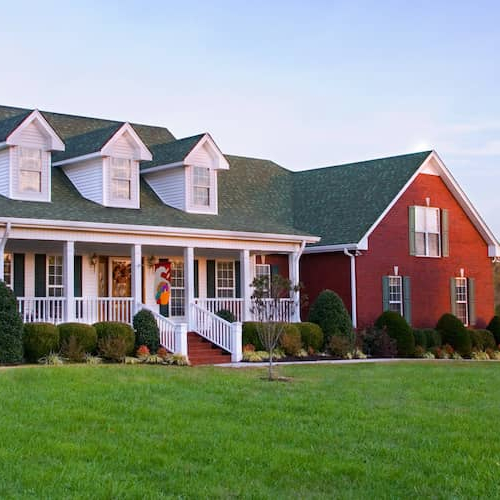What is a mortgage rate?
Contributed by Karen Idelson
Nov 1, 2025
•7-minute read

Your mortgage rate is the interest rate charged on your home loan. The higher the rate, the more you’ll pay each month and over the full term of the loan.
Because your mortgage rate can have a big impact on the cost of buying a home, it’s important to understand how mortgage interest rates work and what steps you can take to try to secure a lower rate.
Mortgage rate basics
Your mortgage rate is the interest rate on your home loan. Interest is the cost of borrowing money, expressed as a percentage of the loan amount charged each year. For a simplified example, if you get a loan for $5,000 at 10% interest, $500 in interest will accrue after one year, assuming you make no payments.
Mortgage rates have varied widely over the past fifty years, falling as low as 2.7% and reaching as high as 18% or more. In the past year, rates have mostly ranged between 6% and 7%.
The higher a loan’s interest rate, the more interest accrues, meaning the bigger your monthly payment and the more you pay over the life of the loan. For example, if you get a $300,000 loan with a 30-year term, it would cost $1,995.91 per month ($718,527.60 overall) at 7% interest and $1,798.65 per month ($647,514 overall) at 6% interest.
You can use Rocket Mortgage’s mortgage calculator to try out different mortgage rates and amounts if you want to learn more.
What’s the difference between the mortgage interest rate and the annual percentage rate (APR)?
When you’re getting a mortgage, you may see the loan’s interest rate expressed as a simple interest rate or an annual percentage rate (APR).
The difference between these rates is that an APR is a better expression of the true cost of borrowing. Interest rates only describe how much interest accrues on your loan. An APR accounts for interest along with the frequency of compounding and fees such as origination fees and closing costs.
Because APRs incorporate other costs, the APR of a loan is usually higher than the loan’s rate. For example, on October 13, 2025, Rocket Mortgage® 30-year fixed-rate loan with a rate of 6.375% and an APR of 6.651%.
What are the different types of mortgage rates?
Mortgage rates can come in one of two forms: fixed and adjustable.
Fixed-rate mortgages
If you have a fixed-rate mortgage, that means that the interest rate of your loan does not change. It remains the same for the entire life of the loan.
Of the mortgages in the United States, 92% are fixed-rate loans. These loans are popular because they offer certainty. You don’t have to worry about the rate rising and making your monthly payment unaffordable. They also let you lock in a low rate without having to worry about losing it later on.
Adjustable-rate mortgages
Adjustable-rate mortgages (ARMs) have interest rates that can change over time. That means that as the ARM rate rises or falls, your monthly payment could also rise and fall.
Generally, ARMs have an introductory period where the rate is fixed, then the rate adjusts on a regular schedule afterward. For example, a 5/1 ARM has a rate that is fixed for the first five years, then adjusts once per year after that.
ARMs can be less predictable than fixed-rate loans. If rates rise, your payment could increase so much that it becomes unaffordable. However, they usually have lower rates than fixed-rate loans, at least at first. That makes them cheaper upfront and popular with people who plan to sell the home or refinance before the rate lock period ends.
To help protect consumers, there are sometimes limits on how much an ARM’s rate can adjust.
Usually, these loans have initial adjustment and subsequent adjustment caps, which are maximum amounts that the rate can change for the first rate adjustment and each rate adjustment thereafter. ARMs may also have a maximum rate, placing a limit on how high the rate and monthly payment can rise.
How is your mortgage rate determined?
The interest rate of your mortgage can vary based on some personal factors that you may be able to control, as well as wider market factors that are not within your control.
Personal factors
When lenders set the interest rate of a loan, one of the things they consider is the perceived risk of the loan. The higher the perceived risk that you’ll default on the loan, the higher the interest rate the lender will charge to compensate for that risk.
To assess the risk of a loan, lenders have a lengthy underwriting process for mortgages. You’ll need to provide a lot of financial documentation and let the lender examine your finances and credit to decide whether or not to offer a loan.
When setting rates, lenders use three main factors:
- Income and debt. The more money you make and the lower your debt-to-income ratio, the less risky you look to lenders, helping you land a lower rate.
- Credit score. Good credit shows that you can handle debt well, letting lenders offer a lower rate.
- Down payment. The bigger your down payment, the more equity you’ll have in the home, and the less risk the lender has to accept by offering a loan, letting you get a lower mortgage rate.
Market factors
On top of personal factors like your income and credit score, there are wider market factors that influence your mortgage rate.
The three main things that impact rates are:
- Inflation. When inflation is high, lenders usually raise rates to account for the falling value of money. During times of high inflation, the Fed may raise the federal funds rate to try to make it more expensive to borrow money and bring inflation down.
- Federal Reserve rates. The Federal Reserve frequently changes benchmark interest rates that affect how much it costs for banks to borrow money from each other. If the Fed raises rates, mortgage rates usually follow.
- The mortgage-backed securities market. Lenders usually package their loans into mortgage-backed securities (MBS) and sell them to investors on the open market. If the market for MBS is strong, lenders may lower rates so they can originate more loans and sell more MBS. If the market weakens, rates may go up.
What’s the ideal mortgage rate?
The lower your mortgage’s interest rate, the lower your monthly payment and the less you’ll pay over the life of the loan. Mortgage rates can be volatile, so what’s considered a good rate today may be a poor rate next month or next year.
To understand what a good rate looks like, keep a close eye on daily mortgage rates. Anything below the benchmark is a good deal. You can use rates advertised by local lenders and major banks as a good example, as well as check data on loan rates from the Federal Reserve.
How can you get a good mortgage interest rate?
While some factors that affect mortgage rates are out of your control, there are things you can do to secure a lower interest rate.
- Improve your credit score: This might be the most important step, as borrowers with a higher credit score are usually offered lower interest rates.
- Purchase mortgage points: You can prepay some of the interest on your mortgage loan by buying mortgage points, which will lower your rate.
- Save for a large down payment: A larger down payment means a smaller loan, which can lead to a lower interest rate. You may be able to avoid private mortgage insurance (PMI). There are also down payment assistance programs and grants for those who qualify.
- Reduce your debt-to-income ratio (DTI): Lowering your DTI, especially revolving accounts like credit cards, makes your debt loom less against your income.
- Lock in rates: If interest rates drop after you apply for a loan, lock in your rate until closing so you don’t lose it.
Shopping around for a loan is also a good way to try to save. You can compare terms, rates, and other details of potential loans this way.
Can you change your current mortgage rate?
For the majority of borrowers who have a fixed-rate mortgage, there are few options for changing their mortgage rate.
One way to change your mortgage rate is to refinance your loan. That involves taking out a new loan and paying off the old one, replacing the old mortgage with a new one. Keep in mind that you’ll have to pay closing costs and other fees when getting your new mortgage, so you’ll only want to refinance if rates have dropped by enough to make the savings significant.
There are a few different types of mortgage refinancing:
- Rate-and-term refinance. The most basic form of refinancing is replacing your loan with one that has a new rate and term.
- Cash-out refinance. This replaces your mortgage with a new one with a higher balance, letting you take the difference out of your home’s equity as cash that you can use for other purposes.
- FHA streamline refinance. This type of refinance is available for FHA loans and is usually quick due to minimal documentation requirements.
- No-closing-cost refinance. These refinance loans have no closing costs or upfront fees but compensate for those savings with higher interest rates.
Refinancing is an option for people who are on top of their mortgage payments. If you find yourself struggling to handle your mortgage, you may also be able to adjust your interest rate by working with your lender to pursue loan modification.
Loan modification involves adjusting the details of your loan, such as lowering its rate or extending the loan’s term to make monthly payments more affordable. Lenders will sometimes work with struggling borrowers, but it isn’t guaranteed. Still, it does not hurt to ask if you’re having trouble making payments.
The bottom line: Comparison-shop to lock in the best mortgage rate
The interest rate of your mortgage is one of the most important factors in determining your monthly payment and the total cost of your loan. While some market factors that impact rates are out of your control, there’s a lot you can do to influence your loan’s rate.
If you already have a mortgage and want to change your mortgage rate, you can consider a mortgage refinance to see if it will benefit you. One of the most important things is to shop around with multiple lenders to see which offers the best deal.
If you’re ready to start applying for mortgages, you can begin the application process with Rocket Mortgage® today.

TJ Porter
TJ Porter has ten years of experience as a personal finance writer covering investing, banking, credit, and more.
TJ's interest in personal finance began as he looked for ways to stretch his own dollars through deals or reward points. In all of his writing, TJ aims to provide easy to understand and actionable content that can help readers make financial choices that work for them.
When he's not writing about finance, TJ enjoys games (of the video and board variety), cooking and reading.
Related Resources

11-minute read
What is a 30-year fixed-rate mortgage?
A 30-year fixed-rate mortgage is common among homeowners who prefer stable payments. Learn more about this ...
Read more

10-minute read
14 questions to ask a mortgage lender
The best way to pinpoint the right mortgage lender for you is to ask plenty of questions. Read through these 14 essential ones to get you started.
Read more

7-minute read
Why mortgage rates are still rising and how you can still buy in 2025
Wondering why mortgage interest rates are so high in 2025? Learn what’s driving up rates and how smart strategies can help you find a home you can afford.
Read more